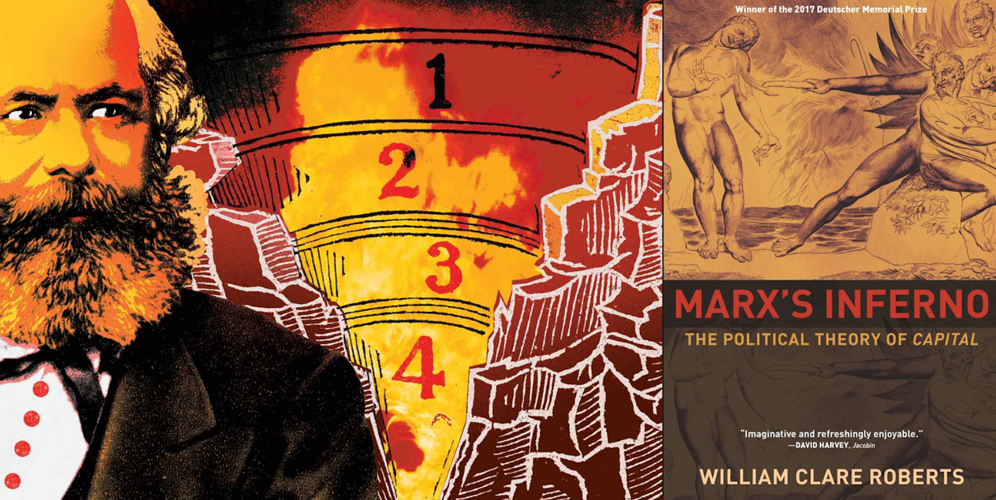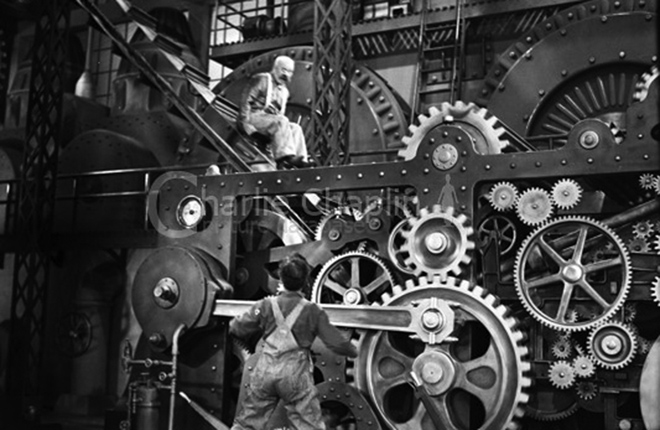Calendar of Events
S Sun
M Mon
T Tue
W Wed
T Thu
F Fri
S Sat
0 events,
1 event,
Descent Into the Inferno: The Politics of Marx’s Capital
Descent Into the Inferno: The Politics of Marx’s Capital
Marx’s Inferno, by William Clare Roberts, reconstructs the major arguments of volume I of Karl Marx’s Capital and inaugurates a completely new reading. His argument is that Capital was primarily a careful engagement with the motives and aims of the workers’ movement of the mid-19th century. Understood in this light, Capital emerges as a profound work of political theory. For Roberts, Capital was ingeniously modeled on Dante’s Inferno, with Marx in the role of the proletariat's Virgil guiding us down to the secret depths of capitalism’s “social Hell.”
0 events,
0 events,
1 event,
6 Plays of Bertolt Brecht
6 Plays of Bertolt Brecht
Beginning April 23 we will read aloud six of the many plays Bertolt Brecht wrote between the 1920s and his death in 1956. The six plays are The Threepenny Opera, The Mother, The Exception and The Rule, Mother Courage and Her Children, The Good Person of Szechuan and The Resistable Rise of Arturo Ui. There will be time to read aloud—taking on various characters among ourselves. There will also be substantive discussion of these works which span all the decades of his writing. The Epic theater, musical theater along with the learning plays are represented in this selection of plays. Each session will be conducted via Zoom until we have an all-clear to return to the classroom. With your registration, the zoom password will be sent to you.
0 events,
1 event,
Capital, Volume 3, 2nd Sessions
Capital, Volume 3, 2nd Sessions
The study of Volume III is essential to understanding the complex dynamics at work in the present realities we are facing and how these realities are the necessary results of the inner logic of capital. In this moribund stage of late capitalist/imperialist development we see the rise of rentier and finance capital—the introduction of financial instruments being used to make money make more money, jumping over and above the actual real wealth produced by trading on future wealth (derivatives and other forms of fictitious capital); overriding supply and demand as a price mechanism in such necessities as foodstuffs so that their prices continuously rise resulting in more poverty and starvation on a world scale and here in the US; turning new technologies into means of collecting rents—the internet, mobile devices; expropriation of taxes paid by the working class to developers who are often tax exempt while our city and state governments give them tracts of our physical space; commodification of debt; privatization of public spaces, properties and institutions; foreclosures; and the list goes on.
0 events,
1 event,
Descent Into the Inferno: The Politics of Marx’s Capital
Descent Into the Inferno: The Politics of Marx’s Capital
Marx’s Inferno, by William Clare Roberts, reconstructs the major arguments of volume I of Karl Marx’s Capital and inaugurates a completely new reading. His argument is that Capital was primarily a careful engagement with the motives and aims of the workers’ movement of the mid-19th century. Understood in this light, Capital emerges as a profound work of political theory. For Roberts, Capital was ingeniously modeled on Dante’s Inferno, with Marx in the role of the proletariat's Virgil guiding us down to the secret depths of capitalism’s “social Hell.”
0 events,
0 events,
1 event,
6 Plays of Bertolt Brecht
6 Plays of Bertolt Brecht
Beginning April 23 we will read aloud six of the many plays Bertolt Brecht wrote between the 1920s and his death in 1956. The six plays are The Threepenny Opera, The Mother, The Exception and The Rule, Mother Courage and Her Children, The Good Person of Szechuan and The Resistable Rise of Arturo Ui. There will be time to read aloud—taking on various characters among ourselves. There will also be substantive discussion of these works which span all the decades of his writing. The Epic theater, musical theater along with the learning plays are represented in this selection of plays. Each session will be conducted via Zoom until we have an all-clear to return to the classroom. With your registration, the zoom password will be sent to you.
0 events,
1 event,
Capital, Volume 3, 2nd Sessions
Capital, Volume 3, 2nd Sessions
The study of Volume III is essential to understanding the complex dynamics at work in the present realities we are facing and how these realities are the necessary results of the inner logic of capital. In this moribund stage of late capitalist/imperialist development we see the rise of rentier and finance capital—the introduction of financial instruments being used to make money make more money, jumping over and above the actual real wealth produced by trading on future wealth (derivatives and other forms of fictitious capital); overriding supply and demand as a price mechanism in such necessities as foodstuffs so that their prices continuously rise resulting in more poverty and starvation on a world scale and here in the US; turning new technologies into means of collecting rents—the internet, mobile devices; expropriation of taxes paid by the working class to developers who are often tax exempt while our city and state governments give them tracts of our physical space; commodification of debt; privatization of public spaces, properties and institutions; foreclosures; and the list goes on.
0 events,
1 event,
Descent Into the Inferno: The Politics of Marx’s Capital
Descent Into the Inferno: The Politics of Marx’s Capital
Marx’s Inferno, by William Clare Roberts, reconstructs the major arguments of volume I of Karl Marx’s Capital and inaugurates a completely new reading. His argument is that Capital was primarily a careful engagement with the motives and aims of the workers’ movement of the mid-19th century. Understood in this light, Capital emerges as a profound work of political theory. For Roberts, Capital was ingeniously modeled on Dante’s Inferno, with Marx in the role of the proletariat's Virgil guiding us down to the secret depths of capitalism’s “social Hell.”
0 events,
1 event,
Socialism or Barbarism? (and Existential Despair)
Socialism or Barbarism? (and Existential Despair)
The four panelists will address the existential moment we are all navigating in the face of the multiple crises facing us in the light of the multiple tipping points that threaten existence yet are necessary to further accumulate capital. Following presentations from the four panelists, the audience is invited to enlarge the discussion with their own questions and comments.
1 event,
6 Plays of Bertolt Brecht
6 Plays of Bertolt Brecht
Beginning April 23 we will read aloud six of the many plays Bertolt Brecht wrote between the 1920s and his death in 1956. The six plays are The Threepenny Opera, The Mother, The Exception and The Rule, Mother Courage and Her Children, The Good Person of Szechuan and The Resistable Rise of Arturo Ui. There will be time to read aloud—taking on various characters among ourselves. There will also be substantive discussion of these works which span all the decades of his writing. The Epic theater, musical theater along with the learning plays are represented in this selection of plays. Each session will be conducted via Zoom until we have an all-clear to return to the classroom. With your registration, the zoom password will be sent to you.
0 events,
1 event,
Capital, Volume 3, 2nd Sessions
Capital, Volume 3, 2nd Sessions
The study of Volume III is essential to understanding the complex dynamics at work in the present realities we are facing and how these realities are the necessary results of the inner logic of capital. In this moribund stage of late capitalist/imperialist development we see the rise of rentier and finance capital—the introduction of financial instruments being used to make money make more money, jumping over and above the actual real wealth produced by trading on future wealth (derivatives and other forms of fictitious capital); overriding supply and demand as a price mechanism in such necessities as foodstuffs so that their prices continuously rise resulting in more poverty and starvation on a world scale and here in the US; turning new technologies into means of collecting rents—the internet, mobile devices; expropriation of taxes paid by the working class to developers who are often tax exempt while our city and state governments give them tracts of our physical space; commodification of debt; privatization of public spaces, properties and institutions; foreclosures; and the list goes on.
0 events,
1 event,
Descent Into the Inferno: The Politics of Marx’s Capital
Descent Into the Inferno: The Politics of Marx’s Capital
Marx’s Inferno, by William Clare Roberts, reconstructs the major arguments of volume I of Karl Marx’s Capital and inaugurates a completely new reading. His argument is that Capital was primarily a careful engagement with the motives and aims of the workers’ movement of the mid-19th century. Understood in this light, Capital emerges as a profound work of political theory. For Roberts, Capital was ingeniously modeled on Dante’s Inferno, with Marx in the role of the proletariat's Virgil guiding us down to the secret depths of capitalism’s “social Hell.”
0 events,
0 events,
1 event,
6 Plays of Bertolt Brecht
6 Plays of Bertolt Brecht
Beginning April 23 we will read aloud six of the many plays Bertolt Brecht wrote between the 1920s and his death in 1956. The six plays are The Threepenny Opera, The Mother, The Exception and The Rule, Mother Courage and Her Children, The Good Person of Szechuan and The Resistable Rise of Arturo Ui. There will be time to read aloud—taking on various characters among ourselves. There will also be substantive discussion of these works which span all the decades of his writing. The Epic theater, musical theater along with the learning plays are represented in this selection of plays. Each session will be conducted via Zoom until we have an all-clear to return to the classroom. With your registration, the zoom password will be sent to you.
1 event,
Final Friday Films: Modern Times
Final Friday Films: Modern Times
Bringing back The Tramp to the era of sound in 1936, Chaplin plays an assembly line worker where he is subjected to being force-fed by a malfunctioning "feeding machine" (cutting the vital minutes of lunch) and an accelerating assembly line where he screws nuts at an ever-increasing rate onto pieces of machinery.
1 event,
Capital, Volume 3, 2nd Sessions
Capital, Volume 3, 2nd Sessions
The study of Volume III is essential to understanding the complex dynamics at work in the present realities we are facing and how these realities are the necessary results of the inner logic of capital. In this moribund stage of late capitalist/imperialist development we see the rise of rentier and finance capital—the introduction of financial instruments being used to make money make more money, jumping over and above the actual real wealth produced by trading on future wealth (derivatives and other forms of fictitious capital); overriding supply and demand as a price mechanism in such necessities as foodstuffs so that their prices continuously rise resulting in more poverty and starvation on a world scale and here in the US; turning new technologies into means of collecting rents—the internet, mobile devices; expropriation of taxes paid by the working class to developers who are often tax exempt while our city and state governments give them tracts of our physical space; commodification of debt; privatization of public spaces, properties and institutions; foreclosures; and the list goes on.
0 events,
0 events,
0 events,
0 events,
1 event,
6 Plays of Bertolt Brecht
6 Plays of Bertolt Brecht
Beginning April 23 we will read aloud six of the many plays Bertolt Brecht wrote between the 1920s and his death in 1956. The six plays are The Threepenny Opera, The Mother, The Exception and The Rule, Mother Courage and Her Children, The Good Person of Szechuan and The Resistable Rise of Arturo Ui. There will be time to read aloud—taking on various characters among ourselves. There will also be substantive discussion of these works which span all the decades of his writing. The Epic theater, musical theater along with the learning plays are represented in this selection of plays. Each session will be conducted via Zoom until we have an all-clear to return to the classroom. With your registration, the zoom password will be sent to you.
0 events,
1 event,
Capital, Volume 3, 2nd Sessions
Capital, Volume 3, 2nd Sessions
The study of Volume III is essential to understanding the complex dynamics at work in the present realities we are facing and how these realities are the necessary results of the inner logic of capital. In this moribund stage of late capitalist/imperialist development we see the rise of rentier and finance capital—the introduction of financial instruments being used to make money make more money, jumping over and above the actual real wealth produced by trading on future wealth (derivatives and other forms of fictitious capital); overriding supply and demand as a price mechanism in such necessities as foodstuffs so that their prices continuously rise resulting in more poverty and starvation on a world scale and here in the US; turning new technologies into means of collecting rents—the internet, mobile devices; expropriation of taxes paid by the working class to developers who are often tax exempt while our city and state governments give them tracts of our physical space; commodification of debt; privatization of public spaces, properties and institutions; foreclosures; and the list goes on.





